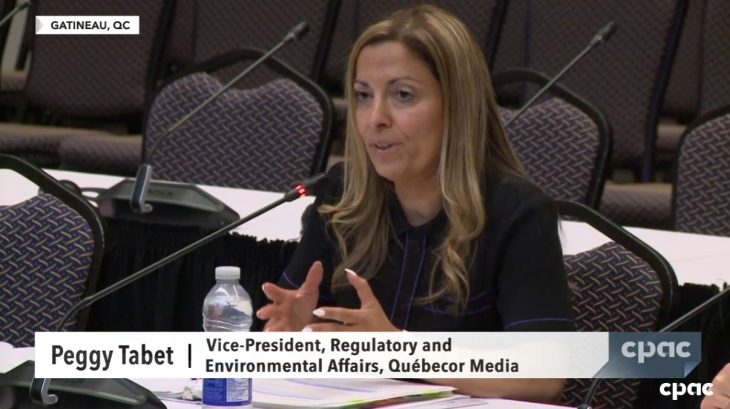
By Ahmad Hathout
Quebecor said Thursday that the CRTC should consider eliminating rules that have no equivalent in the online world, including what it calls micromanaging of commercial relationships under the decade-old Wholesale Code.
Similar to sentiment from Bell on Wednesday, Quebecor executives told the CRTC studying the market dynamics between broadcasters and programmers that the Canadian system is no longer a “walled garden” environment closed off from the myriad of online options, and that more needs to be done to level the playing field.
Quebecor’s recommendations in general include the removal of the Wholesale Code; in particular, it includes addressing the meddling in commercial negotiations by way of strict rules on programming and pricing.
For example, it is asking the commission to eliminate flat-rate pricing, such as the $25 placed on the mandated skinny basic TV package, which includes programs that must be carried by broadcasters – known as 9.1(1)(h) services.
“It’s quite minimal,” Peggy Tabet, vice president of regulatory and environmental affairs at Quebecor Media, said about the uptake of the current iteration of the skinny basic plan by the company’s subscribers.
“And the reason … it’s not attractive at all,” she continued, noting the problem is in the makeup and price of the package. “The service is not competitive compared with the other offers that we have elsewhere.”
The company is recommending that distributors be able to market the price and packaging how they choose. If the CRTC wants to maintain the must-carry services that go into these plans, it continued, then they must be funded differently. That is, instead of being floated by wholesale rates broadcasters pay, their upkeep should come from a fund that the foreign online services pay into. The Canadian broadcaster in this contemplation would just carry the services.
This configuration, Quebecor argues, will ensure the sustainability of must-carry programs while not burdening broadcasters who are losing subscribers to the online streamers.
Quebecor’s views on these matters are somewhat similar to its bitter rival, Bell. On Wednesday, Bell executives talked of what they conveyed as a regulatory albatross emanating from the 2015 Let’s Talk TV decision, which includes the managing of commercial negotiations that they say have resulted in “more protracted commercial negotiations” since the imposition of the rules in question.
One example Bell raised is that it cannot, as a programmer, negotiate a lower rate with a distributor of its programs in exchange for broader penetration. As a result, they either can’t do a deal, or they do, but the package is not the optimal configuration to compete against the online streamers that are free from these burdens.
Bell said the skinny basic offering, spawned by that same decade-old decision, has been challenging to it because it cannot add discretionary services and bump up the price to compete against better-bundled offerings on the market.
Bell and Telus have been introducing TV bundles that include foreign streaming services at a lower price than if they were purchased separately.
Bell, like Quebecor, recommends a fund to support the must-carry programs that go into those skinny basic plans; but unlike Quebecor, Bell would have Canadian broadcasters contribute to that fund.
To get to a place of maximum deference to companies, Quebecor recommends that the CRTC regulate ex-post instead of ex-ante. The idea is that you strip these Wholesale Code rules and allow the parties to determine the best package and price. Then, if required, you use existing regulatory tools, such as the undue preference/disadvantage rules and mediation and arbitration to ensure fairness.
“Essentially our proposal is that you settle issues as they arise, but don’t try to settle issues or problems that don’t exist,” Tabet said.
That leads right into the standstill rule, which stipulates that parties in a commercial dispute must maintain the status quo until their issues are resolved.
Quebecor urges the commission to end its “misuse” by “certain companies in order to obtain or maintain de factor access rights.”
To do this, it is recommending a maximum 90-day period for the standstill, during which the commission must make a decision – if the parties don’t already solve their own issues by then.
The standstill would apply in one of two situations in Quebecor’s world: when the companies come to the CRTC before the expiry of their existing agreement, or following the filing of a complaint of undue preference/disadvantage or non-compliance.
“It should no longer be possible for programming companies to invoke the rule of the status quo when they see fit to avoid or delay,” Quebecor said in its opening submission.
There have been some ongoing high-profile carry disputes: Corus and Rogers are currently engaged in one that dates back to September 2023; Rogers and Bell are engaged in their own fight; and Telus is currently engaged in a carry dispute with both Corus and Bell.
Music, media and tech company Stingray, however, urged caution on that matter. Appearing Thursday, the company said while broadcasters may have legitimate commercial reasons for why they want to stop carrying programs, it is asking the CRTC to create a list of “what those reasons could be” and require broadcasters to comply with those criteria.
The CRTC is also studying how to best prominently feature Canadian content on these platforms.
Stingray recommends that the commission adopt a “comprehensive framework to ensure Canadian services, including independent services, are given a ‘home field advantage’ such that they are featured prominently on all platforms – within packages and bundles, on menus of apps, and electronic program guides.”
Screenshot of Peggy Tabet, vice president of regulatory and environmental affairs at Quebecor Media, on Thursday


